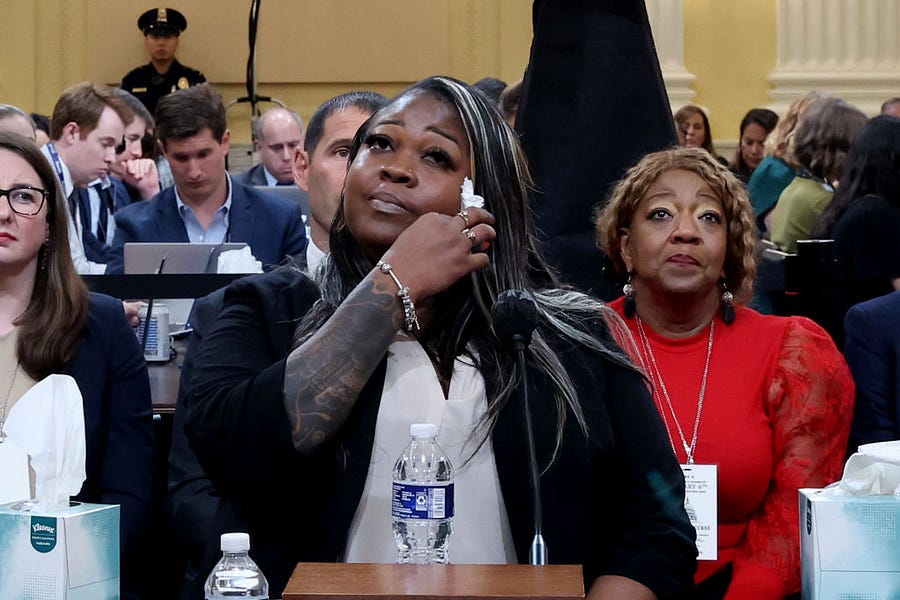Earlier this month I read a paragraph that helped crystalize the reason for one of the most important dynamics of the American culture wars—the extreme reluctance of partisans to condemn or critique their ostensible allies even when they strongly disagree or even hate what they do. The paragraph is from Ryan Grim’s report in The Intercept on the remarkable level of infighting in progressive organizations and the silence of those leaders who are unwilling to stand against the radicals in their midst:
The silence stems partly, one senior leader in an organization said, from a fear of feeding right-wing trolls who are working to undermine the left. Adopting their language and framing feels like surrendering to malign forces, but ignoring it has only allowed the issues to fester. “The right has labeled it ‘cancel culture’ or ‘callout culture,’” he said, “so when we talk about our own movement, it’s hard because we’re using the frame of the right. It’s very hard because there’s all these associations and analysis that we disagree with, when we’re using their frame. So it’s like, ‘How do we talk about it?’”
Catch that? They know something is wrong, but they will not confront it publicly because it might give ammunition to the right. Partisan combat is more important even than the health of their own movement. They will permit a cultural disease to fester and spread rather than give one ounce of ammunition to their political opponents.
This principle is dangerous enough when applied to cancel culture. It’s downright deadly when applied to political violence. Right now right and left should be immediately and directly focused on purging and rejecting violent extremism. Instead, even peaceful partisans are focused on their opponents’ sins, and their selective focus enables political violence.
In this newsletter, I’m going to share a number of incidents of actual or threatened violence (and conspiracy theories that enable violence), and I’m not going to declare which side is worse. Quite frankly, I’m done with that exercise. In fact, if deciding which side is worse is your focus, then you’re part of the problem. Condemn political violence. Period.
On the left, it’s time to deal decisively with the actual and threatened violence of pro-choice activists. A pro-choice activist tried to assassinate Brett Kavanaugh. Pro-choice activists have firebombed pro-life crisis pregnancy centers. Radical pro-choice activists have threatened even more dramatic action if Justice Samuel Alito’s draft Dobbs opinion stands, declaring “We need them to be afraid of us.”
And this violence is of course coming after a wave of violent protests in 2020. Progressives still haven’t fully reckoned with the cultural and political impact of the George Floyd riots. Peaceful protests were laudable, but the violent outbursts were utterly unjustifiable and understandably shocking to tens of millions of Americans.
The right has no moral high ground. Today the January 6 committee heard disturbing testimony from Republican state officials who faced terrible threats for upholding the law and rightfully declaring Joe Biden the winner of their respective states’ electoral votes. The January 6 insurrection itself was one of the most alarming incidents of political violence in American history.
And if you think the radical right is calming down, Missouri Republican Senate frontrunner Eric Greitens yesterday posted an ad that featured him hunting “RINOs” (Republicans in Name Only) with a SWAT team and a shotgun. And this weekend the Texas Republican Party passed a party platform that rejects the results of the 2020 election and calls for a secession referendum.
Sadly, I’m barely scratching the surface of our political violence problem. There are countless other incidents I can raise on both left and right. But I’m asking, no I’m begging, Republicans and Democrats to clean their own houses. And that means doing three simple things:
First, stop whatabouting. When someone on the other side condemns violence, it’s destructive and inflammatory to immediately respond by declaring that the other side is just as bad (or worse.) The unwillingness to immediately, unequivocally, and without reservation join in the condemnation of an illegal act is inherently divisive.
Second, fight selective outrage. It’s a natural human impulse to be more outraged at violence directed at someone you like. There’s a deep well of sympathy for people who suffer for a righteous cause. There’s less sympathy for people who suffer for a cause you deem unworthy. There’s even less sympathy for people whose actions or conduct you find intolerable or provocative.
Yet selective outrage is deeply harmful to the body politic. It creates the impression that one’s appreciation for the humanity and worth of another human being is directly related to their political positions or their personality. Selective outrage further wounds those who already suffer profound harm. It creates a double dose of pain—the first coming from the attack or the threat and the second arising from the indifference or hostility of your fellow citizens.
Third, reject selective curiosity. This might be the most insidious and subtle of our public maladies. Our siloed news environment means that many right and left-wing Americans can cite chapter and verse of every single outrage committed by the other side while remaining shockingly ignorant of their allies’ atrocities.
I can’t tell you how many Republicans I know who are utterly ignorant of some of the most basic details of Trump’s effort to overturn the election. Yet they can cite chapter and verse of silly Disney diversity powerpoints or know all about each and every campus outrage featured on Fox News.
Partisan media diets are a product of selective curiosity. We want to know what our friends and allies think. We lap up stories of our opponents’ perfidy. How many Republicans know Shaye Moss’ name? How many know her story? Gateway Pundit and other Trump Republicans targeted her and her mother, a fellow Georgia election worker named Ruby Freeman. They publicly and falsely claimed the two women committed election fraud. The horrific results were outlined in her lawsuit:
At the height of Defendants’ campaign of disinformation, Ms. Freeman, at the recommendation of the FBI, fled her home and did not return for two months. On January 6, 2021, a crowd on foot and in vehicles surrounded Ms. Freeman’s house. Ms. Freeman was forced to shutter her online business when social media became impossible to navigate. Ms. Moss has suffered personal and professional consequences in her ongoing work on Fulton County elections. On at least two occasions, strangers showed up at her grandmother’s home and attempted to push into the house in order to make a “citizens’ arrest.” Fulton County elections’ general email address would forward incoming emails to Ms. Moss and many of her colleagues, filling her workplace with harassing messages.
Here’s Shaye Moss describing her fears in her own words before the January 6 committee:
And here’s Ruby Freedman:
Every American should burn with anger at this testimony. Her life was put in danger and turned upside down, as she said “all because of lies.”
America is in a dangerous place. And every single instinct that tells us to excuse, minimize, or rationalize our own side’s misconduct—for fear of giving them “ammunition” in the culture war—pushes us closer to the abyss. There is no substitute for moral courage in this moment, and there is no better way to start than by standing athwart your own side’s extremism and yelling stop.
One last thing …
Speaking of moral courage, read these words by Arizona House Speaker Rusty Bowers, transcribed by our own Andrew Egger. This is what integrity looks like:







Please note that we at The Dispatch hold ourselves, our work, and our commenters to a higher standard than other places on the internet. We welcome comments that foster genuine debate or discussion—including comments critical of us or our work—but responses that include ad hominem attacks on fellow Dispatch members or are intended to stoke fear and anger may be moderated.
With your membership, you only have the ability to comment on The Morning Dispatch articles. Consider upgrading to join the conversation everywhere.